By Eduardo Baptista, scholar of Yenching Academy, Peking University
Madame Fidel's African hair salon in central Beijing brings to life the famous saying, "if the mountain won't come to you, you must go to the mountain." The capital's ongoing transformation into a multicultural city does not merely involve ever-growing communities of migrants, but also entails the transplanting of shops and businesses that twenty years ago, one could only find outside China. Madam Fidel's hair salon is one of such places.
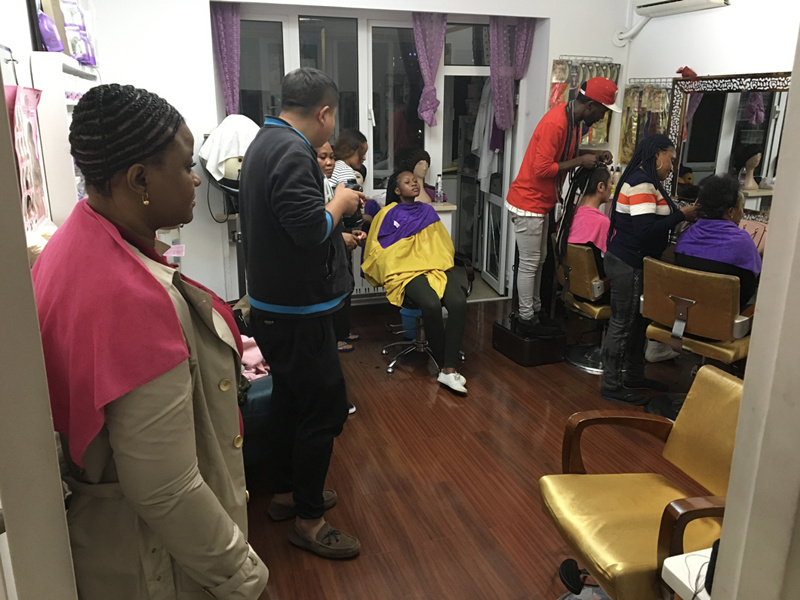
Madame Fidel's hair salon on a busy Saturday evening. (Photograph: Eduardo Baptista)
The salon is located in the Taoyuan Diplomatic Residence Compound, close to the famous nightlife district of Sanlintun. Its origin and location sprang from a most essential need every African resident in Beijing faces: a trustworthy hair stylist. For these temporary residents of Beijing, the language barrier makes the transmission of instructions difficult, especially asking for a specific hairstyle. More importantly, regular Chinese hair salons have no experience handling the thicker texture of African hair, so even perfect Chinese would not be sufficient to avoid a disastrous outcome.
Therefore an African hair salon specializing in tressing, rastas, and other typically African hairstyles is convenient to say the least. Every weekend, from early morning to late at night, Fidel and her six assistants are hard at work, sometimes spending over four hours with one client, ensuring that the final product is true to what one would find in an African country.
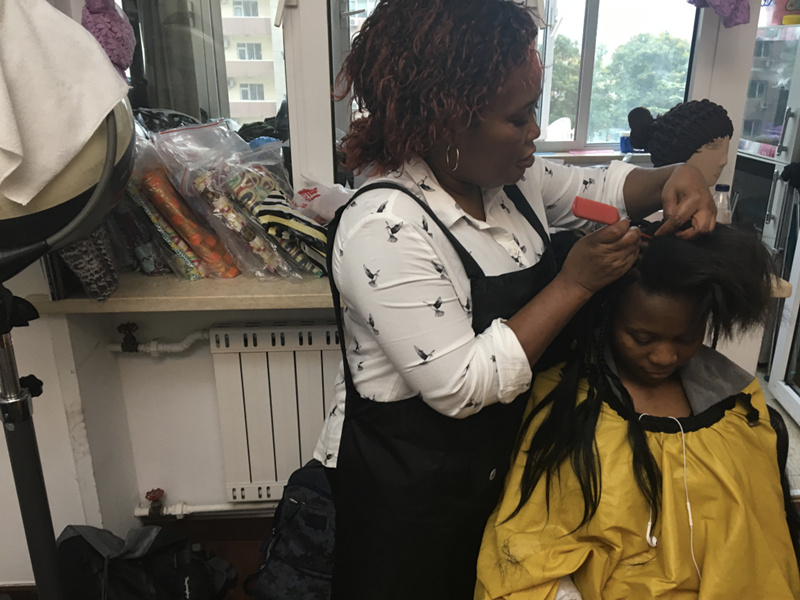
Madame Fidel tresses the hair of a young Zambian women, one of the many African students in Beijing’s top universities. (Photograph: Eduardo Baptista)
In Fidel's eyes, her rock-solid Christian faith is what lies behind the success of her business. "God is my one true blessing. It was he who brought me to China and it was he who gave me this hair salon." she observed, her voice rising with passion. "A few years ago, a nun told me 'Fidel, go back home and pray to God, for he will reward you with a big hair salon'. So I went back home and spent two weeks praying, throwing myself on the floor for the holy Father."
As luck would have it, a few days later she received a phone call from a friend telling her that he’d come across an abandoned hair salon in the center of Beijing. "It had everything, mirrors, chairs, equipment, nothing was missing. God had left this place for me to bring it to life again," she said. A few minutes after first seeing the space, she signed the contract, becoming the owner of what is now the most popular African hair salon in the capital.
Fidel's Christian faith has made her fearless in her approach to living in Beijing, allowing her to quickly grasp the ins and outs of living as an immigrant, running a business, and communicating with the locals in Beijing. Unsurprisingly, she is described by all of her six assistants as the woman who settles all their problems.
One of her assistants, Sharon, has only just begun her life here in Beijing. Coming from Liberia, a country devastated by two brutal civil wars, her status in China is that of a refugee. Every month, the UN negotiates on her behalf with the municipal government to help extend her visa. Despite speaking no Chinese and feeling lonely, she does not feel like an alien in China. "I know the Chinese from my home country. They have a big fishing company at the side of my house in Liberia, they rebuilt the university I went to, and our two countries have a very good relationship."
Yet for some of Fidel’s clients, getting accustomed to life in Beijing has proved impossible. Patrícia Oliveira, 41, is an accountant at the Angolan embassy. Despite having arrived in February, she still spends all of her free time indoors, avoiding the outside environment in which she feels so helpless, owing to a language barrier that she feels very self-conscious about. "Without language you can't do anything. Making friends, going shopping, everything becomes impossible. Whenever I go to the market, everyone has to use a calculator to tell me how much everything costs," she dejectedly remarks. "I have thought about signing up for Chinese classes at the school opposite the embassy, but for some reason I just haven’t got round to it."
Whereas some of Fidel’s African clients have a hard time adapting to Chinese society and its many norms, her Chinese clients come to the salon looking for a hairstyle that challenges these very norms.
Mila Koran (Chinese name: 謝琴), an up-and-coming rapper under Lanxiong Records, has been a regular client for the past few months. Heavily influenced by old-school American rap–Nas, Biggie, Tupac–Mila has always sought to distinguish herself from the mainstream music scene.
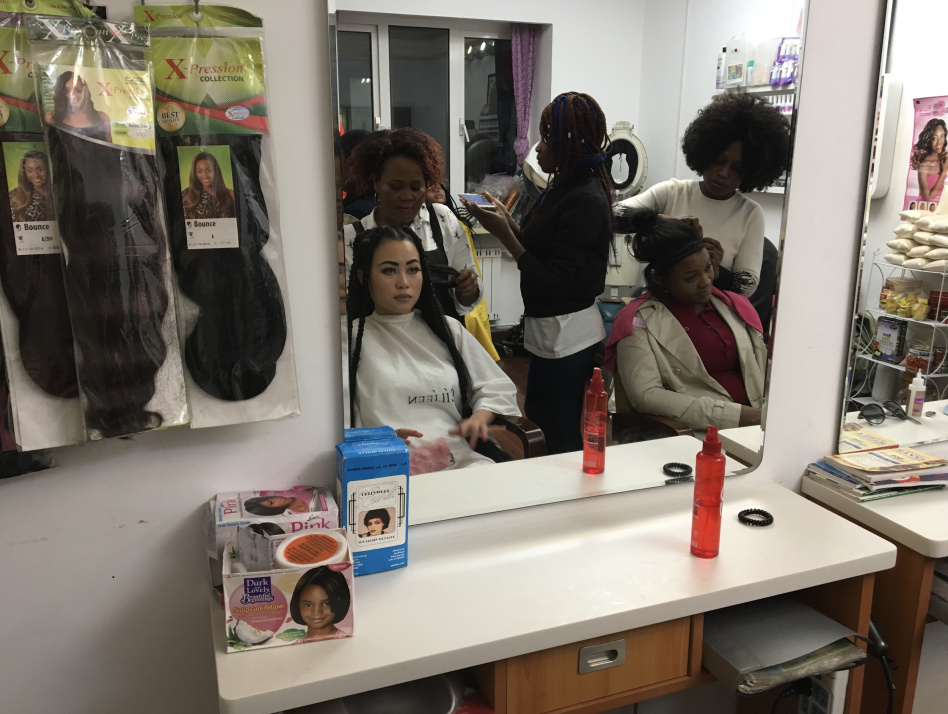
Mila from Sichuan, Patrícia from Angola get their hair done side by side. (Photograph: Eduardo Baptista)
"Chinese hip-hop is not real hip-hop. Even the judges in 'China Has Hip-Hop' (中國有嘻哈) don't know hip-hop, they're just pop singers," sharing her opinions as Madame Fidel begins tressing her hair into eight thick weaves.
A Sichuan native, Mila has always rebelled against what society has expected her to do, pursuing her career in accordance to what she felt was truest to herself. She loves keeping her skin tanned, refuses to cover her body up, and is married to a foreigner.
But by no means is she being different for the sake of attention. "I never think about trying to be original you know," she observed, "I just want to be myself and let my music show who I am. There is a lot of competition to be the next hip-hop sensation but I never let it get to my head."
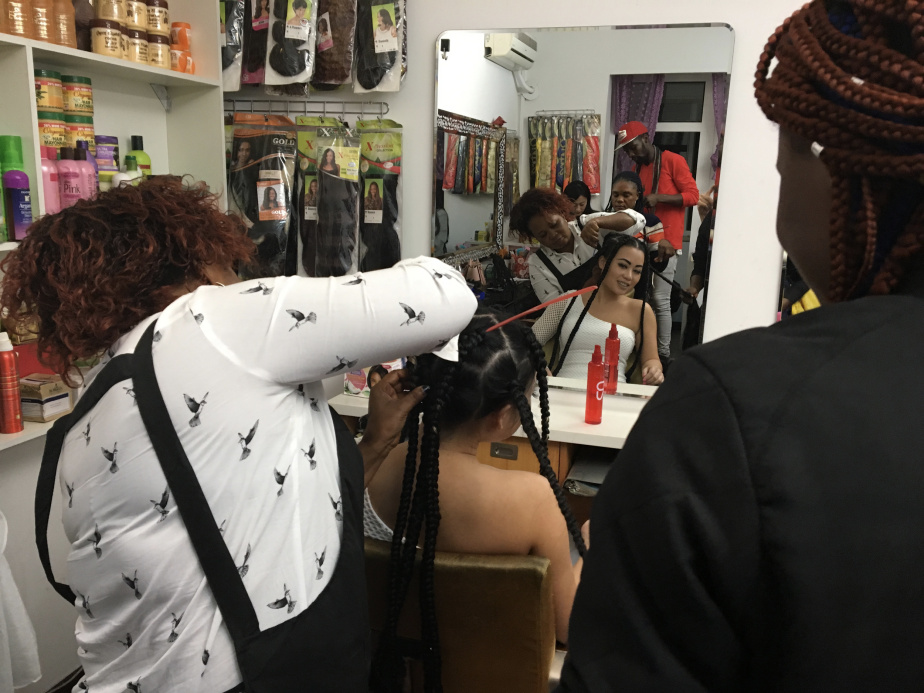
After two hours, Mila’s "spider" tress hairstyle is on the verge of completion. (Photograph: Eduardo Baptista)
Just like Madame Fidel, Mila is a fearless Beijinger, and just like the many African immigrants who work and frequent the hair salon, she is used to being thought of as strange, used to being stared at as if she were a foreigner. The photo cover of Mila's second album will highlight such converging experiences; she asks Madame Fidel if two of her assistants can pose with her.
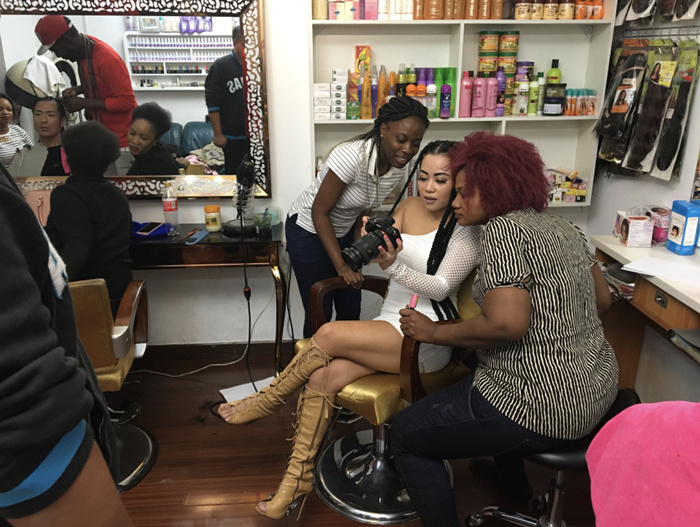
Mila shows two of Madame Fidel’s assistants how all three of them look in her photo cover. (Photograph: Eduardo Baptista)
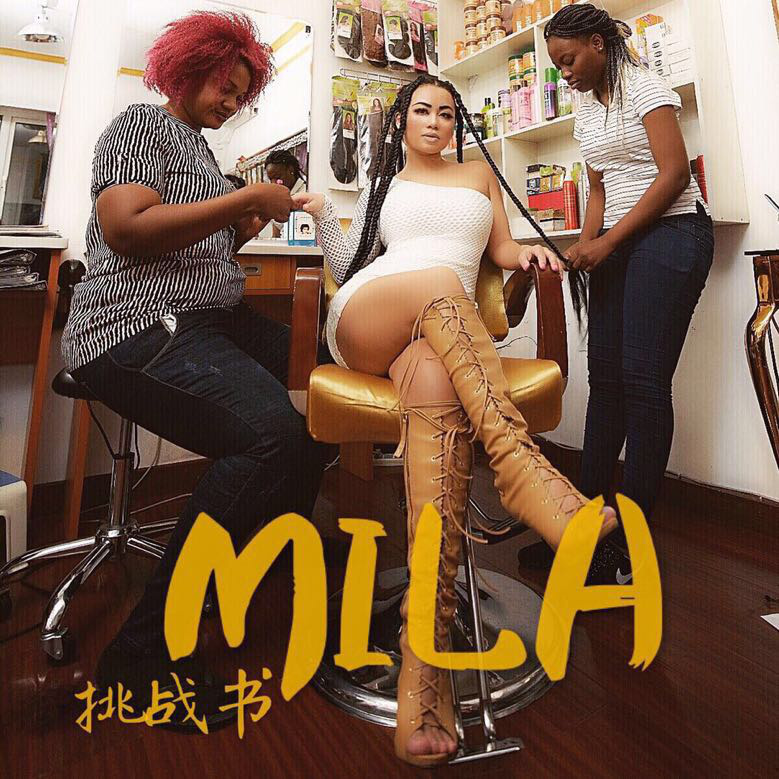
The official cover photo for Mila’s latest album, Letter of Challenge(挑戰書), released last month. (Photograph: Lanxiong Records)
Madame Fidel's hair salon is a microcosm for the larger changes happening in China's fastest-developing cities. The influx of African immigrants shows no sign of stopping, and in response a generation of intrepid Chinese youth is going beyond simply accepting their presence, seeking to understand, experience and even use African culture for creative purposes. One can continue regarding Beijing as the ancient capital of China, but there is another identity, palpable in this hair salon, that is slowly rising to the surface: Beijing, the hybrid city, where styles become mixed rather than antagonistic, progressive rather than conservative, respectful of tradition whilst cosmopolitan at heart.
(The opinions expressed here do not necessarily reflect the opinions of Panview or CCTV.com. )

Panview offers a new window of understanding the world as well as China through the views, opinions, and analysis of experts. We also welcome outside submissions, so feel free to send in your own editorials to "globalopinion@vip.cntv.cn" for consideration.
















